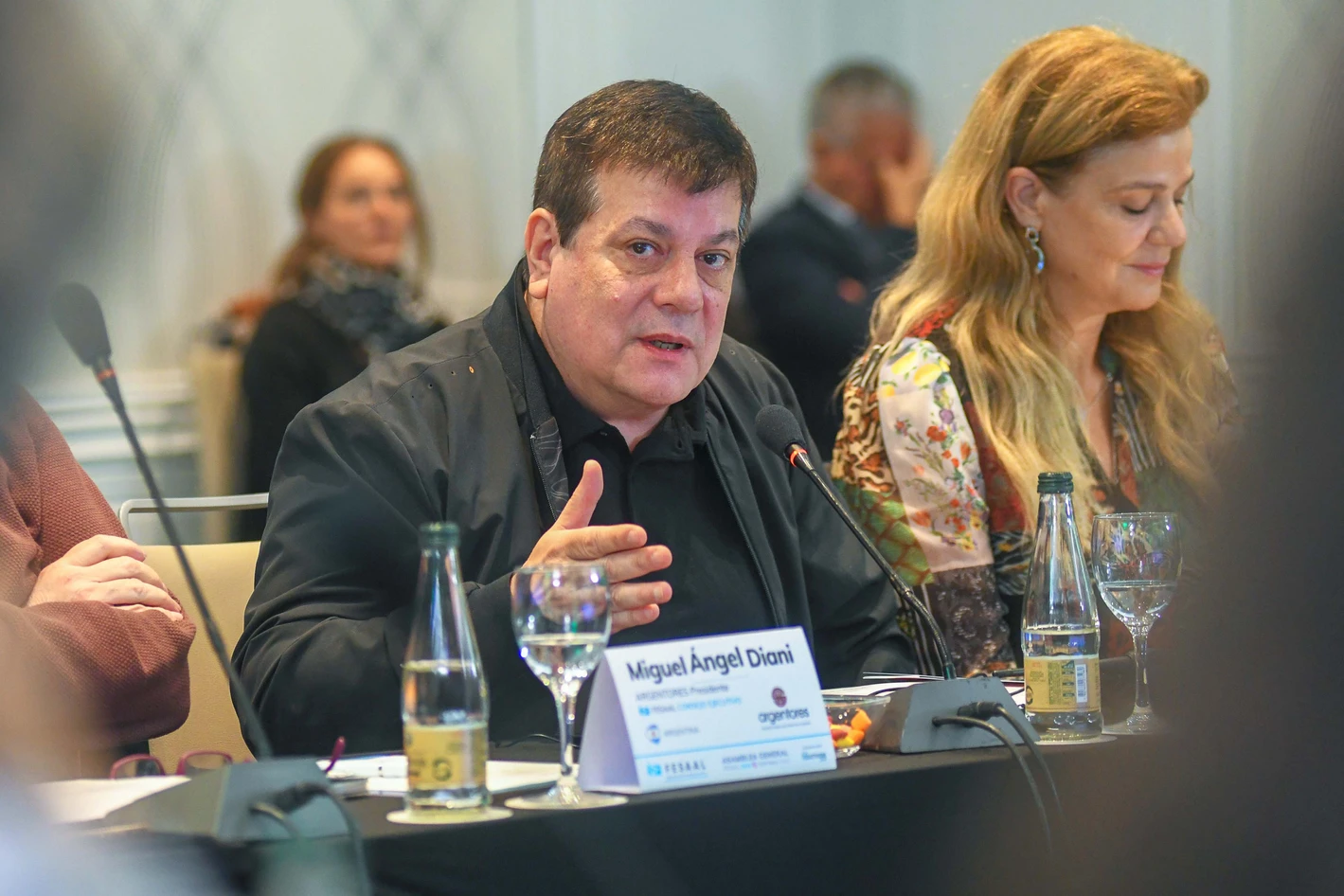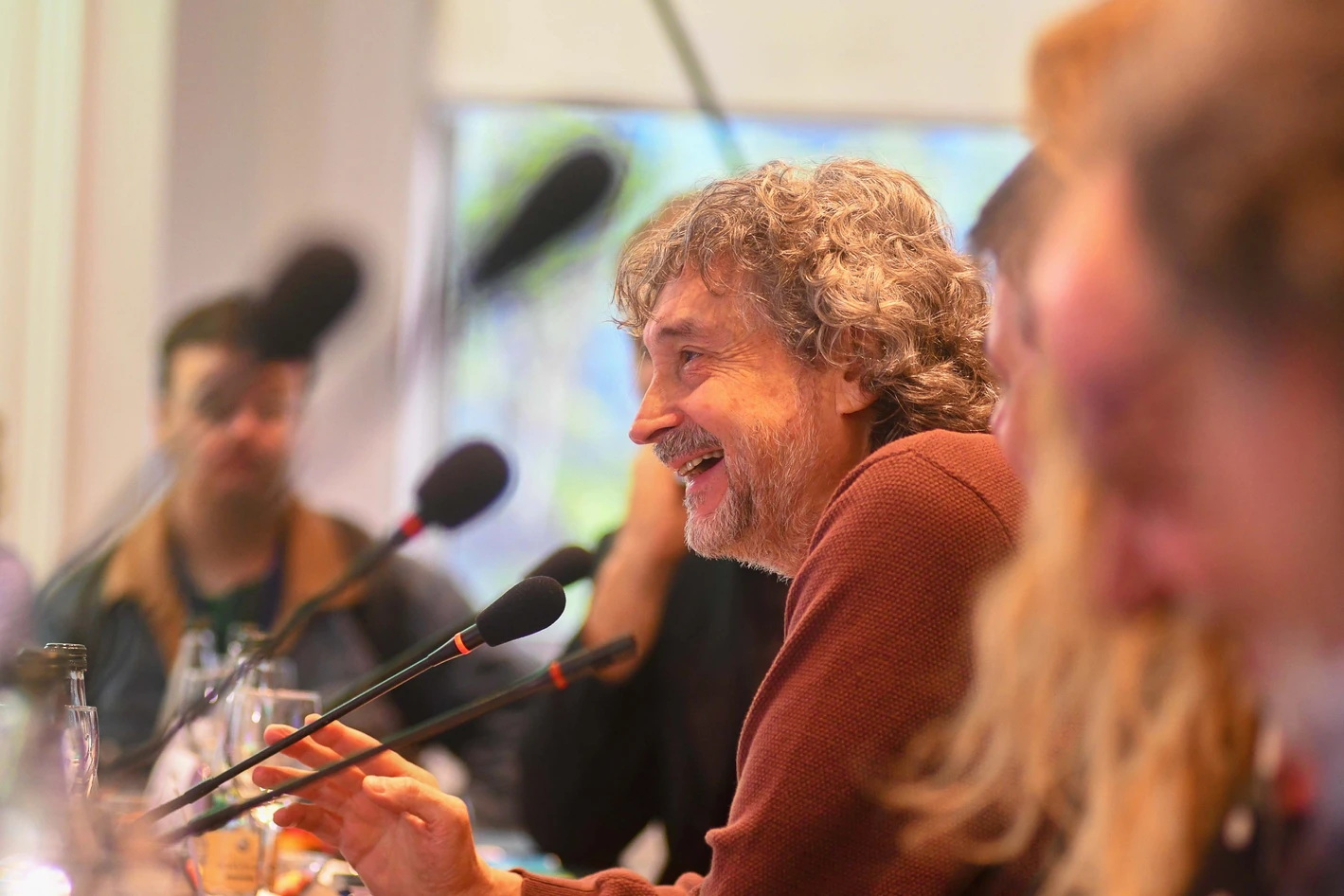FESAAL successfully held the Annual General Assembly 2023 in Santiago, Chile
- CreatorsNews
- Nov 27, 2023
- 6 min read
Updated: Feb 14
With a record attendance, the Latin American Audiovisual Authors Societies Federation (FESAAL) successfully held its annual assembly on November 2nd and 3rd in the city of Santiago, Chile, with the local society ATN hosting the event.
During this occasion, representatives of authors, directors, and screenwriters from across Latin America, gathered under this Federation, were welcomed at the NH Collection Hotel by Daniella Castagno (President of ATN), Silvio Caiozzi (Vice President), César Cuadra (General Director), and Felipe Schuster (Legal Advisor).
Among the entities that participated were DAC (Argentina), represented by Carlos Galettini (President), Carmen Guarini (Vice President), Horacio Maldonado (Secretary General), Inés de Oliveira Cézar (Deputy Secretary General), Marcelo Piñeyro (Deputy Secretary of Social Action and Honorary President of FESAAL), Luis Mangiavillano (Executive General Director), and Daniel Di Napoli (General Director of Systems); ARGENTORES (Argentina) was represented by Miguel Ángel Diani (President) and Germán Gutiérrez (Legal Advisor).
DBCA (Brazil) was represented through Henrique de Freitas Lima (President); Malu de Martino (Vice President) and Hamsa Wood (Communication Director) represented GEDAR (Brazil), Thiago Dottori (President), and Sylvia Palma (Member of the Board).
Representing AGADU (Uruguay) were Alexis Buenseñor (President) and Eduardo de Freitas (Legal Advisor); and DGU (Uruguay) was represented by Javier Palleiro (President). Representing DASC (Colombia) were Teresa Saldarriaga (Vice President) and Camila Loboguerrero (Secretary General); from REDES (Colombia), Alexandra Cardona Restrepo (President), Carlos Gaviria (Vice President), Ricardo Corral (Secretary General), and Yuri Alvarado (Director of Declaration of Works) attended the assembly.
Representing CREADORES PY (Paraguay) were Vanella Barbieri (Legal Advisor) and Claudia Zárate (Treasurer); EDAP (Panama) was represented by Luis Romero (Secretary General); SOGEM (Mexico) was represented by Gerardo Luna Islas (President), and the Mexican directors' entity SOMEDIRE was represented by Juan Antonio de la Riva (President).
Among the government authorities who attended the opening of the Assembly were the Minister of Cultures of Chile, Carolina Arredondo; Raúl Vilches, Head of Creative Economy at ProChile, and Daniela Espinoza, Executive Secretary of the Council of Art and the Audiovisual Industry.
Current Situation in Chile
It is worth mentioning that FESAAL decided to hold its Annual Assembly in Chile with the aim of supporting the actions that ATN has been undertaking, following the sanctioning of the Ricardo Larraín law in 2016, which grants audiovisual creators their rights.
In this regard, an overview of the law and the Audiovisual Industry in Chile was presented. Daniella Castagno, President of ATN, emphasized, "We have made steady progress, not necessarily large, but secure."
On the other hand, ATN's Legal Advisor, Felipe Schuster, stated, "After six years of the Ricardo Larraín law being in effect, we are in the second phase, which is making the right effective. Our main focus was to obtain payment for the rights of users. Those most willing to comply with the law were those in the pay-TV industry. It has been useful to date; we have received rights and have been able to distribute them."
Minister of Cultures, Carolina Arredondo, affirmed, "As a state, we have the commitment to advance authors’ rights, and as the Ministry of Cultures, we have the duty to strengthen them. Therefore, we will initiate a campaign to promote awareness of authors’ rights. This campaign will address the treatment of intellectual property law."
Raúl Vilches, Head of Creative Economy at ProChile, said, "We know that works, from the moment we create them, must have protection. Internationally, it is important to know how to manage your rights, integrate internationally, and add value."
Chile is one of the countries that FESAAL has assisted in establishing its own remuneration law for audiovisual rights of screenwriters and directors, as has occurred in Argentina, Uruguay, Colombia, Panama, and soon Brazil, which is on the verge of sanctioning a law for remuneration in digital media, along with other initiatives that are still in the development and project stage in countries such as Paraguay, Peru, and Ecuador.
In the context of recognizing and valuing all the achievements, the FESAAL 2023 Award was presented for the work carried out to defend the rights of audiovisual authors in Chile to Daniella Castagno, Silvio Caiozzi, and César Cuadra.
FESAAL Meeting in Switzerland with WIPO
Another topic discussed was the participation, in July, of a FESAAL delegation in a meeting with authorities of the World Intellectual Property Organization (WIPO), within the framework of the sixty-fourth series of meetings of the Assemblies of the Member States of WIPO-OMPI held in Geneva, Switzerland.
"The participation of FESAAL in WIPO is well-structured based on the strategy we need to adopt. WIPO represents the interests of many artists, but it has somewhat neglected the audiovisual sector," said Adriana Saldarriaga, a member of FESAAL's Technical and Legal Committee.
In this regard, FESAAL drafted a document presenting the advantages of the right to remuneration for public communication in countries where it has been adopted, emphasizing the importance of WIPO taking a stance on the matter.
"We had a meeting with SAA and CISAC, who participated in the request for the study on remuneration rights. We brought together more groups of authors, but this implies taking into account different legislations, and we have different urgencies regarding central countries. CISAC and SAA want to organize a study covering the entire European continent, Africa, and others, comparing the remuneration rights of Screenwriters, Directors, and musicians. This would take four years of work," explained Germán Gutiérrez.
Luis Mangiavillano said, "We want a study that proves, from the experts at WIPO, the effectiveness of the remuneration right. We chose the law of Colombia as an example. We deviated a bit from the European request for a broader study, which includes other systems of authors’ rights protection, related to reserving rights in contracts (we are proposing a law where authors do not need to reserve anything in contracts). In our proposed right, collective management is mandatory."
Author’s Rights and Gender Equity
As has been happening in various FESAAL Assemblies, a panel was held to discuss gender equity and the role of women in the audiovisual industry.
"The situation of women and diversities in audiovisuals remains unequal. In pursuit of this, we are interested in continuing this space to draw attention to these issues and how to resolve them within our association. Rights are equal, but access to rights is not equal. This is the case worldwide," said Argentine director Carmen Guarini.
In her presentation, Sylvia Palma shared "good news" that in 2022, with the arrival of Lula da Silva's government in Brazil, the National Cinema Agency conducted a survey on gender in Brazilian audiovisuals, and "we were able to see progress."
The Brazilian screenwriter detailed that in her country, "in general, women went from 20% to 40%, doubling their participation in film and television. Afro-descendant women have a very low score, and indigenous or trans women do not score. There is still inequality in remuneration. 19% of films were directed by women. That 19% dominated 43% of the screens, almost half of the Brazilian box office. Women, I must say, are making good cinema."
Colombian director and screenwriter Camila Loboguerrero expressed being "very pleased to see the development of women in the audiovisual industry in Colombia" since "from 2003, there has been an inclusion of women in the industry."
Brazilian director Malu de Martino highlighted that "we are no longer a minority; we are a majority. In this panel, by countries, the female population is larger than the male, except in Paraguay. This is important to evolve in this picture that reflects the situation of women in leadership positions. The change for a more egalitarian society must come from within. Involving men in this decision is important."
Paraguayan director Claudia Zárate detailed that according to "a study, only 18% of film directors in Paraguay are women. INAP launched in 2022 the first film promotion call, with a specific category for projects directed by women."
"The balance between the participation of men and women is very important; it makes societies great. We have been building this shoulder to shoulder. Let's continue and open up more spaces for women," affirmed Colombian screenwriter Alexandra Cardona Restrepo.
Reports and presentations by specialists
FESAAL member countries presented on the authors’ rights of Screenwriters and Directors in the Region and provided reports on Mexico, Argentina, Brazil, Colombia, Uruguay, Panama, and Paraguay.
In the case of Argentina, Inés de Oliveira Cézar, along with Miguel Ángel Diani and Horacio Maldonado, provided details on the work being done between DAC, ARGENTORES, and other entities to approve a new audiovisual law to replace the previous one.
Among other issues, the new law seeks updates in terms of gender and diversity, expands recognized audiovisual formats, and distributes funds federally. It also introduces a federal development fund financed by OTTs, without implying additional costs for users or companies. Some governors have approved this measure, recognizing that it generates employment and productive activity in various provinces of the country.
Additionally, a report was presented by Horacio Maldonado, Miguel Ángel Diani, and Germán Gutiérrez on the events at the AVACI ExCo held in Madrid and the meeting with the SAA.
As part of discussions on technological advances, Daniel Di Napoli, Director of Systems at DAC, spoke about AVSYS (Advancements in the Operating System) with testimonials from societies about the use of AVSYS and their needs.
A Professional Panel of Directors and Screenwriters on "Directing Films and Series for OTT Platforms" was also conducted, moderated by Silvio Caiozzi, Carmen Guarini, Marcelo Piñeyro, Malu de Martino, Henrique de Freitas Lima, Sylvia Palma, Daniella Castagno, and Javier Palleiro.








































































































Comments